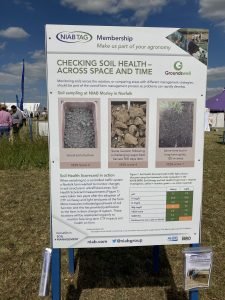English farmers will be able to apply to take part in the Sustainable Farming Incentive – the first element of the government’s new Environmental Land Management (ELM) scheme – from next Thursday, 30 June 2022, it was confirmed by Defra Secretary of State George Eustice at Groundswell.
SFI is a programme of measures that will be introduced as modules. This will include:
- Soil Health – Soil is fundamental to profitable farming. This module will include a sustainable farming soil standard to provide a measure of organic matter and farmers would be paid to sample their soil.
- Nutrients – to investigate alternative approaches and reduce the use and cost of inputs.
- Hedgerows – seen as a key ecological building block, so there will be support to increase this. A carbon code for woodland has already been established.
- Integrated Pest Management (IPM) – This includes cultivation approaches such as: companion cropping growing two different plants together to ‘camouflage’ the crop; intercropping – sowing different varieties of seed in the same mix to build resilience; trap crops to divert pests and encouraging the populations of predators.
Speaking at Groundswell, Secretary of State George Eustice explained: “IPM has come of age but it is a risk to farmers to engage with it. It requires a change of culture and patience for natural systems to get on top of the problem and government needs to recognise this.”
Call for baseline metrics
Also on the platform was NFU president, Minette Batters, who was well supported when she called for metrics to define common baselines, particularly around soil recovery and also to create a statutory target for food production so that it fits within local plans.
“60% self sufficiency in food would be a good target, 75% would be an amazing opportunity,” she said, explaining that to meet this target field grown vegetables and fruit would need to increase. Although recognising the government support of ‘off-land’ growing in vertical farms she observed that more could be grown in the soil.
She also called for tools to better understand soil health and soil based carbon assessments.
Agri-Tech to support sustainable farming in the Innovation Hub
Exhibitors in the Innovation Hub at the Royal Norfolk Show will be demonstrating technologies of relevance to the SFI

Soil nutrient management – NIAB
Soil nutrient management is an approach that aims to more closely match nutrient inputs, such as fertilisers and organic manures to crop demand at different stages of its lifecycle. Applying excessive nutrients, or those that are not ‘bio-available’, are a wasted resource. NIAB will be discussing technology used to support soil nutrient management in the Innovation Hub.
Boosting plant performance and controlling disease – PfBio
PfBio is using naturally occurring and beneficial soil bacteria to suppress plant diseases. This type of ‘biocontrol’ is achieved by identifying varieties of the bacteria Pseudomonas that associates with a particular crop and boosting its presence, so it outcompetes the pathogen. Pseudomonas can also have other benefits, it stimulate the plant immune system as well as promoting plant growth, which increases both health and yield.”
Cereal camo-cropping for sugar beet – BBRO
BBRO are discussing some alternative approaches to pest management. The first is cereal camo-cropping, the theory is that growing a cereal crop in with the sugar beet helps to obscure it by reducing the soil-plant contrast which aphids use to locate sugar beet. The other approach is to use food dyes to change the ground colour and hide the emerging beet.
More about the Innovation Hub
More about the Sustainable Farming Incentive and payments for farmers.











